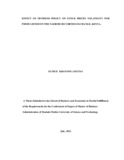| dc.contributor.author | LISUTSA, EUNICE KHANYISI | |
| dc.date.accessioned | 2024-01-16T13:47:30Z | |
| dc.date.available | 2024-01-16T13:47:30Z | |
| dc.date.issued | 2021-07 | |
| dc.identifier.uri | http://ir-library.mmust.ac.ke:8080/xmlui/handle/123456789/2577 | |
| dc.description | Master of Business Administration | en_US |
| dc.description.abstract | Different researchers have failed to reach a consensus after investigating how dividend policy and volatility of share price associate at over time and hence the endless debate on how dividend policy selected by a firm affects stock prices. The relationship between dividend decisions with finance, investment and firm value makes dividend decisions a central element of corporate finance. A more effective and efficient model for dividend decision making is required by managers and investors. Corporate managers will benefit from the finding of this study by understanding the role that the size of their firms play in moderating the effect of dividend policy on stock price volatility of listed firms. The corporate managers will be able to use the findings of this study to determine proper appropriation of their earnings on dividends and retained earnings for future capital gains and hence they would be able to maximize shareholders wealth.This study measures the effect of dividend policy measured by (Dividend yield, dividend payout ratio and earnings per share) on stock price volatility for firms listed on Nairobi Securities exchange.This study uses a longitudinal research design to determine :The effect of dividend payout ratio on stock price volatility for listed firms, the effect of dividend yield on stock price volatility of listed firms, the effect of earnings per share on stock price volatility of listed firms and the moderating effect of firm size on stock price volatility of listed firms. Purposive sampling was used for this study where only firms with complete data for the period of the study were sampled.49 firms were found to have complete data for the period of the study. The research relied entirely on secondary data. Audited Financial statements of listed companies in Kenya were obtained from the NSE and CMA websites. was analyzed using multiple linear regression models and STATA 15 software. Using descriptive statistics data was analyzed using mean, standard deviation, min max, and variance. The findings of the study were presented in tables, charts and graphs. The findings indicated that dividend policy explained up to 35.71% variation in stock price volatility of listed firms. Further, multiple linear regression coefficients indicated that payout ratio and earning per share in that order have positive and significant effect on stock price volatility . However, dividend yield had a negative and significant effect on stock price volatility. Firm size had significant moderating effect on the relationship between dividend policy and stock price volatility as it moves R square from 30.08% to 35.71% accounting for additional 5.63% variance in stock price volatility. The study therefore, concluded that dividend policy influence stock price volatility of listed firms. The study recommended that listed firms Listed firms at NSE need to strike a balance between the amount of money retained and the one paid to shareholders in form of dividends. This will go a long way to strengthening their dividend policy and the level of volatility registered in their share price. | en_US |
| dc.language.iso | en | en_US |
| dc.publisher | MMUST | en_US |
| dc.subject | DIVIDEND, POLICY, STOCK, PRICES, SECURITIES, EXCHANGE | en_US |
| dc.title | EFFECT OF DIVIDEND POLICY ON STOCK PRICES VOLATILITY FOR FIRMS LISTED ON THE NAIROBI SECURITIES EXCHANGE, KENYA. | en_US |
| dc.type | Thesis | en_US |

